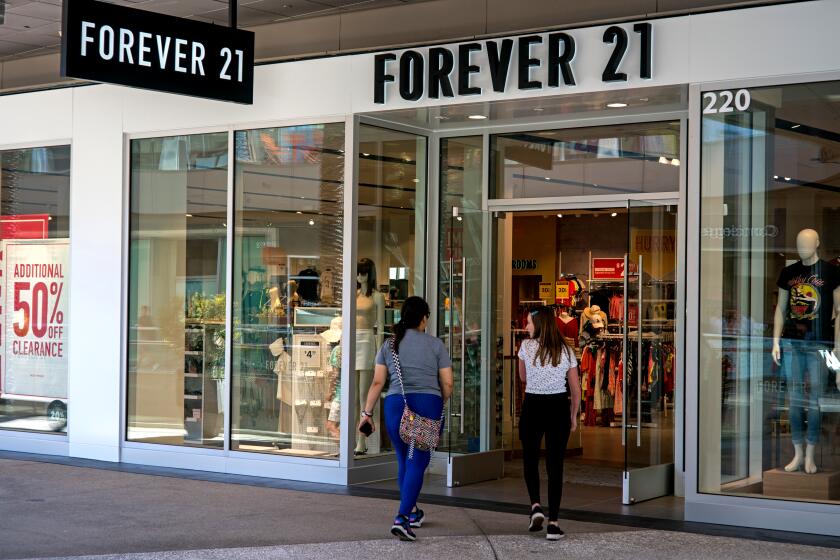Securities Trading Scandals Fail to Dim Appeal of Drexel’s Annual ‘Junk Bond’ Conference
- Share via
The lobby of the Beverly Hilton Hotel at 6:45 a.m. Wednesday, April Fool’s Day, was no place for joking around.
Though traffic outside had yet to awaken, hundreds of business executives and large investors were inside the hotel, milling around importantly. Dressed for success, they were awaiting the opening session of what has become one of America’s highest-powered business get-togethers: Drexel Burnham Lambert’s annual “junk bond” conference.
“You’d think Reagan was here,” one unimpressed hotel worker told a colleague, a reference to the conservatively dressed crowd and the tight security surrounding the conference.
The atmosphere was combined collegiality among those attending and wariness about journalists. Hotel security guards ejected two Los Angeles Times photographers and a reporter from the premises at various times during the day.
Conference sessions are closed to the press, and photographers are barred from the hotel, but journalists from a number of newspapers and television stations were there anyway, looking for a story. Drexel’s meeting, which goes until Saturday, has taken on added significance this year because it comes amid the securities trading scandals that have shaken Wall Street in the past five months.
Those who have agreed to plead guilty to securities fraud since last November include stock speculator Ivan F. Boesky and Los Angeles securities trader Boyd L. Jefferies, both of whom had a close business relationship with the New York-based investment banking house.
Among those who remain under investigation by the Securities and Exchange Commission is Drexel’s superstar bond salesmen, Michael Robert Milken.
Milken is the conference’s perennial attraction, and this year is no exception. Investigation or no investigation, Milken remains a legend among his customers.
“Mike has done an outstanding job in getting people to look at things in a different way,” said Arthur W. Berry, a money manager in New York for Alliance Capital.
Milken is the principal architect of the modern-day, high-yield bond market, now valued at more than $100 billion. But junk bonds, as they are known, are controversial because corporate raiders have used them as a vehicle to finance corporate hostile takeover attempts in recent years.
Detractors have dubbed the Drexel get-together the “Predators’ Ball,”--a label Drexel officials aren’t crazy about. “Some clown named it that,” company spokesman Steve Anreder said.
But, because high-yield bonds have also become a way for smaller companies to raise capital in the public market, Drexel has a loyal following in the more entrepreneurial quarters of corporate America.
“They’ve always done everything they said they would, and more,” said Michael J. Scharf, head of Edgcomb Metals, a firm that generates about $600 million in annual revenue. “I’ve dealt with a lot of investment banking firms and Drexel analyzes situations from a financial point of view better than anyone I know.”
Large institutional investors, such as mutual funds, say the sessions are an excellent way to get to know the chief executives of the companies in which they are investing. About 65 companies, whose specialties range from insurance to biotechnology, are expected to make presentations to the gathered investors.
sh Rare Appearance
The conference marks one the rare public appearances that the reclusive Milken makes each year. He opened Wednesday’s conference, which began promptly at 6:50 a.m. in deference to his desire for an early start to the work day. His business day usually begins about 5 a.m.
Drexel is working hard--and spending heavily on advertising--to dispel the image that it is a company in trouble. Company executives say the investment banking firm, which remains privately held, had record revenue and profit in the first three months of 1987.
Among those attending the conference are some of Drexel’s biggest boosters, but only a few of them were willing to be interviewed.
“They make me feel important all the time,” Scharf said, “even though I’m really not that big a client for them.”
The idea for the conference was conceived in the late 1970s as a way to generate interest in high-yield bonds. The company came up with the idea at a time when the bond market in general was severely depressed because of rising interest rates.
Now in its eighth consecutive year, the conference should draw about 2,500 people this year, compared to 2,000 last year.
More to Read
Inside the business of entertainment
The Wide Shot brings you news, analysis and insights on everything from streaming wars to production — and what it all means for the future.
You may occasionally receive promotional content from the Los Angeles Times.










